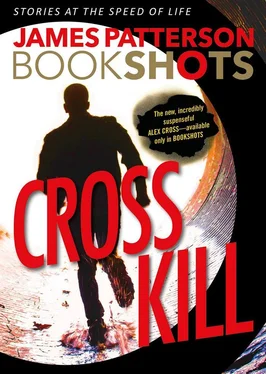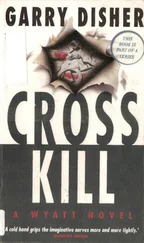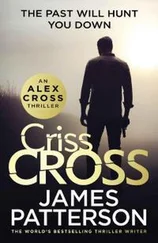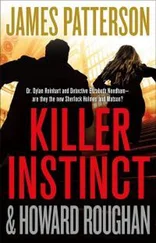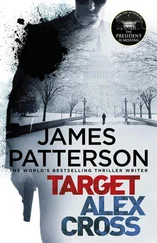Standing at the edge of the woods, perhaps eighty yards from me, was a man in a green rain slicker. He was turning away. When his back was to me, he pulled off his hood, revealing a head of thinning red hair. Then he raised his right hand, and pointed his middle finger at the sky.
And me.
I stood there, too stunned to move for the moment it took for the wind to ebb and the fog to creep back, obscuring the figure, who stepped into the pine barrens and disappeared.
Then my shock evaporated, and I took off, drawing my pistol as I sprinted between the gravestones. Peering through the fog gathering again in the cemetery, I tried to figure out exactly where I’d seen him go into the pines.
There it was, those two monuments. He’d been framed between them. I ran to the spot and looked back toward the fog-obscured backhoe and the exhumed casket. When I thought I had the correct bearings, I turned and headed in a straight line toward the edge of the forest.
“Dr. Cross?” the superintendent called after me. “Where are you going?”
I ignored him and charged to the edge of the dripping pines, scanning the ground and seeing a scuff mark that looked fresh, not yet beaten down by the rain. I pushed my way into the trees.
The forest was thick there, crowded with young saplings with wet branches that bent away and wet needles that slid past my clothes. I stopped, unsure where to go, but then noticed a broken branch on the ground.
The inner wood looked bright and new. So did the broken branch to my left at ten o’clock. I went that way for fifty, maybe seventy-five yards, and then broke into an expanse of older trees, more than ten feet high, and growing in long straight rows, a pine plantation.
Despite the fog, I soon spotted dark, discolored spots on the mat of dead needles that covered the forest floor. I went to them, and saw where he’d kicked up the duff as he’d run down one of those lanes through the trees.
I ran after him, wondering if I could catch up, and numerous times whether I’d lost the way. But then I’d find some disturbance in the pine needles and push on one hundred, two hundred, three hundred yards deeper into the barrens.
What direction was I going? I had no idea, and it didn’t matter. As long as Soneji was leaving signs, I was staying with him. I thought I’d cross a logging road or trail at some point, but didn’t. There was just the monotony of the plantation pines and the swirling fog.
Then the way began to climb up a hill. I could clearly see where he’d had to dig in the edges of his shoes to keep his footing, and more broken branches.
When I hit the top of the knoll, there was a clearing of sorts with a jumble of tree trunks to one side, as if a windstorm had blown them over. I skirted the jumble, crossed the hilltop, and found myself looking down into a long, broad valley of mature pines.
The forest had been thinned there, as if some of the trees had already been harvested. Despite the fog, I could see down a dozen lanes and deeper into the woods than at any other time since I’d entered it. Nothing moved below me.
Nothing at—
A rifle cracked. The bark of a tree next to me exploded and I dove for the ground behind one of those downed tree trunks.
Where was he?
The shot came from the valley. I was sure of it. But where down there?
“Cross?” he called. “I’m coming for you, even from the grave if I have to.”
If it wasn’t him, he’d studied Soneji’s voice, right down to the inflection.
When I didn’t answer, he shouted, “Hear me, Cross?”
He sounded to my right and below me, no more than seventy yards. Raising my head as high as I dared, I scanned the valley there. The fog was in and out, but I thought I’d see him move or adjust his angle if he wanted another shot at me.
But I couldn’t make him out.
“I know I didn’t hit you,” he called, his voice cracking weirdly. “I did, you would have gone down like the shit bag you are.”
I decided not to engage, to let him think he’d gotten lucky, taken me out with one bullet. And it was odd the way his voice had cracked, wasn’t it? Gone to a higher pitch?”
Tense moments passed, a minute and then two, while my eyes darted back and forth, trying to spot him, hoping he’d come in to make sure of the kill.
“How’s your partner?” he called, and I heard him chuckle hoarsely. “He took a hit, didn’t he? What I hear, best-case scenario, he’ll be a veg.”
It took every fiber of my being, but I did not engage with him, even then. I just lay there and waited, scanning and scanning and scanning.
I never saw him go, or heard anything like a distant twig breaking to suggest he was on the move again. He never said another word, and nothing told me he’d left but the time that kept ticking away.
I lowered my head after ten minutes and dug out my phone. No service.
The rain started in earnest then, drumming, beating down the fog and revealing the plantation. Nothing moved but a doe a hundred yards out.
I wanted to get up and go down there, look for him. But if he was waiting, I’d be exposed again. After fifteen more minutes of watching, I crawled back in the direction I’d come until I was well down the backside of the hill.
There was a bitter taste in my mouth when I got to my feet and started back toward the cemetery.
I hadn’t gotten halfway there when my cell phone buzzed in my pocket.
A text from Billie.
“Alex, wherever you are, come. John’s taken a bad turn. We’re on deathwatch here.”
By the time I reached the cemetery, the superintendent had already loaded the casket into the FBI van that would take it to Quantico for examination. I explained the urgency of my situation, and left.
I called ahead to New Jersey, Delaware, and Maryland state police dispatchers, asking for help. When I reached I-95, there were two Jersey state trooper cruisers waiting. One in front, the other behind, they escorted me to the border, where two Delaware cruisers met me. Two more waited when I reached the Maryland line. At times we were going more than a hundred.
Less than two hours after I’d read the text, I got off the elevator to the ICU at GW Medical Center, still in damp clothes and chilled as I ran down the all-too-familiar halls to the waiting area. Billie sat at the back, her feet drawn up under her. Her elbows rested across her knees and she had a skeptical, faraway look in her eye, as if she couldn’t believe that God was doing this to her.
Bree sat at her left, Nana Mama on her right.
“What happened?” I asked.
“They decided to bring him up out of the chemical coma,” Billie said, tears streaming down her cheeks.
“He flatlined. They had to paddle him,” Bree said. “He came back, but his vitals are turning against him.”
“Billie’s called in the priest,” Nana Mama said. “He’s giving John the last rites.”
Whatever control I’d maintained until that point evaporated and I began to grieve in gasps of disbelief and an explosion of sorrow and tears. It was real. My best friend, the indestructible one, Big John Sampson, was going to die.
I sank into a chair and sobbed. Bree came over and hugged me. I leaned into her and cried some more.
The priest came in. “He’s in God’s hands now,” he said, consoling us. “The doctor says there’s nothing more they can do for him.”
“Can we go in?” Billie asked.
“Of course,” he said.
Nana Mama, Billie, and Bree got up. I looked at them, feeling numb.
“I can’t do it,” I said, feeling helpless. “I just can’t watch this. Can you forgive me?”
“I don’t want to either, Alex,” Billie said. “But I want him to hear my voice one last time before he goes.”
Читать дальше
